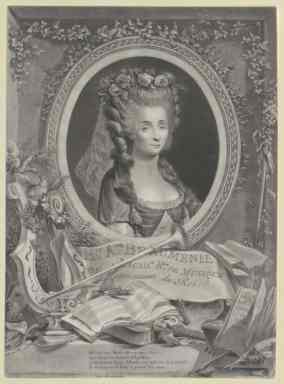Mademoiselle Beaumesnil facts for kids
Henriette Adélaïde Villard (born August 30, 1748 – died October 5, 1813) was a talented French opera singer and composer. She was famously known by her stage name, Mlle Beaumesnil.
Contents
Her Life as a Performer and Composer
Mlle Beaumesnil started acting in small comedy parts when she was just seven years old. She made her big debut as a solo singer at the Paris Opera in 1766. She filled in for the main singer, Sophie Arnould, in the opera Sylvie. After this, she sang in many new and old operas. She hoped to become the main singer after Arnould retired.
Becoming a Lead Singer
When Sophie Arnould left in 1778, another singer, Rosalie Levasseur, was chosen instead of Beaumesnil. Beaumesnil felt this was unfair and wrote a public letter about it. She caused a big discussion but also got a chance to sing the main female role in Gluck's opera Echo et Narcisse in 1779. She finally left the stage in 1781.
Around this time, she married a tenor (a male singer) named Philippe Cauvy. He was a well-known member of the Opéra-Comique.
A Friendly Duel?
There's a famous story about Mlle Beaumesnil having a "pistol duel" with a dancer named Mlle Théodore. The conductor of the Paris Opera orchestra, Jean-Baptiste Rey, tried to stop them. He took their pistols and put them on the grass. But the two women got their pistols back! Luckily, the pistols got wet from the morning dew and didn't fire. After this, the two ladies decided to forget their differences and became friends.
Her Musical Compositions
Mlle Beaumesnil also wrote music. She was one of the first women to have her music performed at the Paris Opera. Her first opera, Anacréon, was not accepted for a public show. It was only performed privately in 1781.
However, in 1784, she wrote music for a part of an older opera called Les festes grecques et romaines. Her new version, called Tibulle et Délie, was a success at the Paris Opera. It was performed alongside Gluck's opera Iphigénie en Aulide. This is the only one of her musical works that still exists today.
Later that same year, her oratorio (a large musical piece for voices and orchestra) called Les Israélites poursuivis par Pharaon was performed. This was the only known oratorio by a French woman from that century.
In 1792, her two-act opéra comique (a type of opera with spoken dialogue) called Plaire, c'est commander was performed in Paris. It was quite successful, with 21 performances.
Not much is known about what happened to Mlle Beaumesnil during the French Revolution. She passed away in Paris in 1813.
Her Works
Here are some of her known musical works:
- Anacréon, a one-act opera, 1781
- Tibulle et Délie ou Les Saturnales, an acte de ballet (a short ballet), 1784
- Les Israëlites poursuivis par Pharaon, an oratorio, 1784
- Plaire, c'est commander, a two-act opéra comique, 1792
See also
 In Spanish: Mademoiselle Beaumesnil para niños
In Spanish: Mademoiselle Beaumesnil para niños
 | Bayard Rustin |
 | Jeannette Carter |
 | Jeremiah A. Brown |


